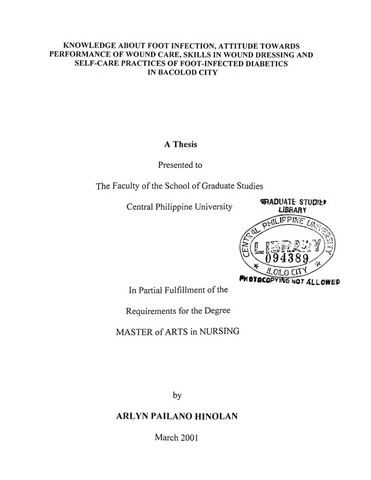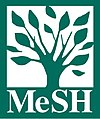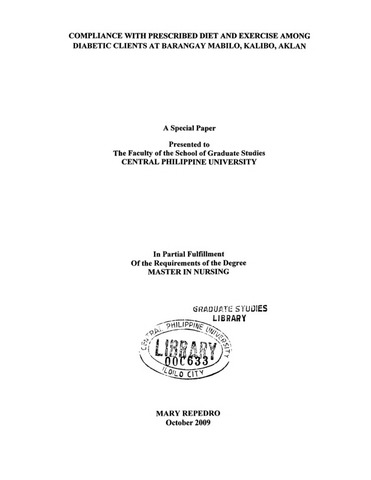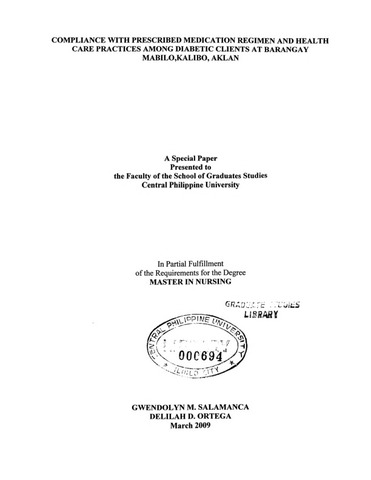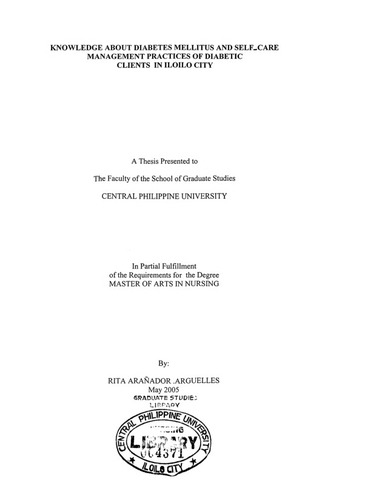Knowledge about foot infection, attitude towards performance of wound care, skills in wound dressing and self-care practices of foot-infected diabetics in Bacolod City
요약
The primary purpose of this study was to determine the diabetics’ knowledge about foot infection, attitude towards performance of wound care, skills in wound dressing and self-care practices and whether their knowledge about foot infection, attitude towards performance of wound and skills in wound dressing are associated with their self-care practices.
Specifically, this study proposed to find out the relationship of: the diabetics' age, gender and educational attainment to knowledge about foot infection, attitude towards performance of wound care, skills in wound dressing and the specific promotive, preventive and curative self-care practices; the diabetics’ knowledge about foot infection to attitude towards performance of wound care, skills in wound dressing and the specific promotive, preventive and curative self-care practices; the diabetics' altitude towards performance of wound care to skills in wound dressing and the specific promotive, preventive and curative self-care practices; the diabetics' skills in wound dressing to the specific promotive, preventive and curative self-care practices.
This study was conducted in the selected Diabetes Speciliasts' clinics in Bacolod City. There were forty five respondents considered as study sample based on the inclusion criteria set.
Description of Respondents
There was a balance distribution of young and old diabetics in the study sample. The majority of them were male and had reached tertiary education.
Knowledge about foot infection, attitudes towards performance of wound, skills in wound dressing and self-care practices
On the average the diabetics’ score on knowledge about foot infection is 5 out of a 10-item test which focused on the basic concepts of foot infection, wound care and its prevention. The mean score (5) indicates the diabetics’ low level knowledge about foot infection.
Despite the diabetics low level knowledge about foot infection, their altitude towards performance of wound care were generally favorable their mean score, being 20 out of a 6-item questions with a perfect score of 30. This means that they agreed that regular wound dressing minimizes foot infection, following doctor 's advice on wound care lessens bacterial growth and cleaning wound from top to bottom or from center outward prevents contamination.
The diabetics skills in wound dressing were far from desirable. As a whole, all the sample respondents were unskilled in wound dressing. The diabetics were not doing the steps in wound dressing correctly: handwashing before and after wound care, preparing of equipment, stroking in washing and cleaning of wound, drying of wound and applying of antiseptic/antibacterial solution.
For their self-care practices, these were divided into three levels: promotive, preventive and curative. The promotive self-care practices accomplished by the sample respondents were following the prescribed dietary regimen and shunning of unhealthy practices like smoking and drinking liquor. The majority of them also performed preventive and curative self-care practices. They practiced wearing of comfortable shoes and cotton socks, washing of feet with soap and running water and drying them with soft towel. They also followed the medication regimen and knew how to clean the wound.
Relationship Between Variables
Age and Selected Factors (Knowledge about Foot Infection, Attitude Towards Performance of Wound Care, Skills in Wound Dressing and Self-Care Practices). I here was no significant relationship between age and the selected factors. The figures however, indicated that the younger the respondents, the more knowledgeable they were, the better were their attitude and they were more skillful than there old counterparts.
Gender and Selected Factors. There was no significant relationship between gender and the selected factors. This means that gender was not an antecedent variable in the outcome of the knowledge about foot infection, attitude towards performance of wound care, skills in wound dressing and self-care practices. Educational Attainment and Selected Factors. There was no significant relationship between educational attainment and the selected factors, except knowledge about foot infection and the specific preventive self-care practices. These were shown by an obtained Gamma value of 0.625 and 0.724 which were significant at 5 percent level, respectively. Understandably, higher education guarantees high level knowledge about foot infection and effective preventive self-care practices.
Self-Care Practices and Knowledge about Foot Infection, Attitude Towards Performance of Wound care and Skills in Wound Dressing. There was a significant relationship between self-care practices (specific promotive and curative only) and knowledge about foot infection and skills in wound dressing, except attitude towards performance of wound care. The direct and positive relationship of self-care practices to knowledge about foot infection means that high level knowledge about foot infection may result in the performance of effective self-care practices specifically for promotive and curative self-care practices.
The influence of skills in wound dressing to self-care practices means that skilled in wound dressing guarantee effective self-care practices. The non-influence of attitude towards performance of wound care to self-care practices mean that favorable attitude towards performance of wound care may not necessarily result in effective self-care practices.
Knowledge About Foot Infection, Attitude Towards Performance of Wound Care, And Skills in Wound Dressing Versus Each Other. There was a significant relationship between knowledge about foot infection and attitude towards performance of wound care and skills in wound dressing. This means that high level knowledge about foot infection guarantees favorable attitude towards performance of wound care and skillfulness in wound dressing.
However, there was no significant relationship between attitude towards performance of wound care and skills in wound dressing. The outcome of skills in wound dressing does not depend on the attitude towards performance of wound care.
Knowledge About Foot Infection and Self-Care Practices Controlling for Attitude Towards Performance of Wound Care and Skills in Wound Dressing. When the relationship between knowledge about foot infection and the self-care practices was analyzed controlling for attitude towards performance of wound care, the obtained r value was 0.468 which increased considerably over the original r of the focal variables. This means that attitude towards performance of wound care does not intervene the relationship of knowledge about foot infection to self-care practices.
However, when skills in wound dressing were controlled, the resulting r value was 0.1090 which decreased substantially over the original r of focal variables. This means that an unstable relationship existed between knowledge about foot infection and self-care practices. Skills in wound dressing are an intervening variable in the relationship of knowledge about foot infection and self-care practices.
Conclusions
In view of the findings, the following conclusions are drawn:
1. Diabetics who had consulted the selected Diabetes Specialists’ clinics in Bacolod City from August to December 2000 had/were:
A. low level knowledge about foot infection
B. favorable attitude towards performance of wound care
C. skilled in wound dressing
D. effective in self-care practices
2. The diabetics' age, gender and educational attainment did not influence knowledge about foot infection, attitude towards performance of wound, skills in wound dressing and self-care practices.
3. The more knowledgeable the diabetics are about foot infection, the more effective are their self-care practices, the better their attitude towards performance of wound care and the more skillful they are in wound dressing.
4. Favorable attitude towards performance of wound care does not guarantee effective self-care practices and skilled in wound dressing.
5. The more skillful the diabetics are in wound dressing, the more effective are their self-care practices.
6. When attitudes toward performance of wound care were controlled, the relationship between the diabetics’ knowledge about foot infection and self-care practices was strengthened. This means that the relationship of
the focal variable is real.
7. When skills in wound dressing were controlled, the relationship between knowledge about foot infection and self-care practices weakened. This means that skills in wound dressing partly influenced the relationship of
the focal variables.
Recommendations
1. The Ministry of Health in cooperation with the Diabetes Association of the Philippines whose main thrust is information-dissemination should intensify their information and education campaign that will improve the diabetics’ knowledge about foot infection, change their attitude towards performance of wound care, skills in wound dressing and positively change their performance of self-care practices. It is recommended that a comprehensive Diabetes Information Drive be designed in the form of regular publication of important diabetes-related topics, seminars/workshops for health care providers and diabetics. Radio and TV commercial shall also be considered to help in the awareness of the disease, its complications and preventions.
2. Medical/Health Care Providers should modify their present clinical interventions that will help diabetics' improve their knowledge about foot infection and skills in wound dressing. It is recommended that Health Care Professional should attend seminars/workshops about diabetes and be made to realize that giving out of accurate information to diabetic-patient is of outmost important.
3. It is further suggested that diabetics should be monitored on the progress of their skills in wound dressing. A Skills Progress Card shall be designed for each individual patient for monitoring purposes.
4. A replication of this study shall be conducted in a wider scale, regional or national to have a database for all diabetics in the Philippines. This data will somehow help the government in assessing the effectiveness of the Diabetes Program in our country.
5. A similar study should be made focusing on other diabetes complications such as: kidney, heart, lung and eye complications.
기술
Abstract only
추천 인용
Hinolan, A. P. (2001). Knowledge about foot infection, attitude towards performance of wound care, skills in wound dressing and self-care practices of foot-infected diabetics in Bacolod City (Unpublished Master's thesis). Central Philippine University, Jaro, Iloilo City.
유형
Thesis주제
키워드
학과
School of Graduate Studies정도
Master of Arts in Nursing선반 위치
GSL Theses 610.73072 H58
물리적 설명
76 leaves
Collections
- Master in Nursing [37]
Related items
Showing items related by title, author, creator and subject.
-
Compliance with prescribed diet and exercise among diabetic clients at Barangay Mabilo, Kalibo, Aklan
Repedro, Mary (2009)This research study was conducted to identify the factors associated with compliance to prescribed diet and exercise among diagnosed diabetic clients at Barangay Mabilo, Kalibo, Aklan. Specifically, this study aimed to ... -
Compliance with prescribed medication regimen and health care practices among diabetic clients at Barangay Mabilo, Kalibo, Aklan
Salamanca, Gwendolyn M.; Ortega, Delilah D. (2009)The study was conducted to determine selected factors associated with compliance with prescribed medication regimen among diabetic clients at Barangay Mabilo, Kalibo, Aklan. The respondents of this study included ... -
Knowledge about diabetes mellitus and self-care management practices of diabetic clients in Iloilo City
Arguelles, Rita A. (2005)This study was conducted to determine the diabetic clients’ knowledge about diabetes mellitus and their self-care management practices. It also intended to find out whether knowledge and self-care practices vary according ...


